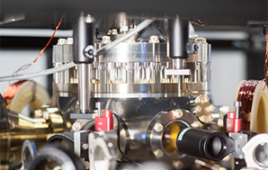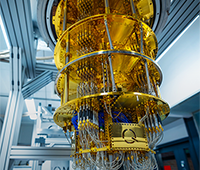World’s Largest Computing Grid Surpasses 100 Sites
British physicists and computer scientists are playing a key role in facing one of the biggest computing problems in the world—how to process the massive data volumes expected from the world’s biggest particle physics experiment, the Large Hadron Collider (LHC), at CERN in Switzerland. When the LHC becomes operational in 2007,it will produce Petabytes (millions of Gigabytes) of data. To manage this, researchers have been creating a Grid to distribute the processing and storage of data around the world. On March 15, the LHC Computing Grid (LCG) project announced that its massive computing Grid now includes more than 100 sites in 31 countries, making it the world’s largest international scientific Grid. The UK is the biggest single contributor to the LCG, with more than a fifth of the Grid’s processing power at its 16 sites.
The name ‘Grid’ comes from analogy with the Electricity Grid. Users can obtain a resource such as electricity, or in this case, computer processing, from a variety of sources to supply their needs, without needing to know where it comes from. This means that a scientist can be based anywhere in the world and request calculations on data from CERN, that will then be performed across numerous sites, countries and even continents. The sites participating in the LCG project are primarily universities and research laboratories. They contribute more than 10,000 central processor units (CPUs) and a total of nearly 10 million Gigabytes of storage capacity on disk and tape. More than 2,000 of these CPUs are in the UK, along with 1 million Gigabytes of storage capacity. LCG receives substantial support from the EU-funded project, Enabling Grids for E-sciencE (EGEE), which is a major contributor to the operations of the LCG project. The UK contribution to LCG is through the £ 33m GridPP project, funded by the Particle Physics and Astronomy Research Council (PPARC). Professor Tony Doyle, GridPP Project Leader, said, "LCG has taken Grid technology up to the next level in terms of scale. At GridPP, we’ve managed to create the largest science Grid in the UK by collaborating exceptionally well with the CERN-based team and others in LCG and EGEE. We all recognize that continued partnership in the next couple of years will be critical in terms of ensuring that the Grid operates effectively and efficiently." The LHC is a particle accelerator that will recreate conditions from moments after the Big Bang in order to study the fundamental properties of sub-atomic particles. The LCG project was launched in 2003 and is growing rapidly. The Grid operated by the LCG project is already being tested by the four major experiments that will use the LHC, namely ALICE, ATLAS, CMS and LHCb, to simulate the computing conditions expected once the LHC is fully operational. As a result, the LCG partners are achieving record-breaking results for high-speed data transfer, distributed processing and storage. Already, other scientific applications from disciplines such as biomedicine and geophysics are being tested on this unique computing infrastructure, with the support of the EGEE project. Grid computing is a term used for many varieties of distributed computing. For the LCG project, the objective is to unite the computing capacity that exists in scientific organizations around the globe. This requires special middleware—the software that allows seamless operations across multiple institutional domains—so that users of the Grid perceive it as a single resource. Underlying the middleware is the basic infrastructure of this Grid, which consists of extremely high-speed networks, clusters of hundreds of computers at the participating sites, as well as banks of disk servers and tape silos for the data storage, also distributed around the globe. The LCG Project Leader Les Robertson, based at CERN’s IT Department, said: "We are well ahead of our original schedule for reaching 100 sites, and thanks is due to the many partner sites around the world for their contribution to this success. Making a Grid like this is a truly collaborative effort." Mark Linesch, the Chair of the Global Grid Forum, which is a community-initiated forum of thousands of individuals from industry and research leading the global standardization effort for Grid computing, described LCG’s 100-site milestone as "great news for Grids, and great news for science. Without doubt the LCG project is pushing the envelope for what an international science Grid can do." Despite the record-breaking scale of the LCG project today, Robertson notes that the current processing capacity of this Grid is estimated to be just 5% of the long-term needs of the LHC. Therefore, the LCG will continue to grow rapidly over the coming two years, both by adding sites and increasing resources available at existing sites. In addition, the exponential increase in processor speed and disk storage capacity inherent to the IT industry will help to achieve the LHC’s ambitious computing goals. An overview of the current status of the LCG project, listing all participating sites, can be found at http://goc.grid-support.ac.uk/gppmonWorld/cert_maps/CE.html.




